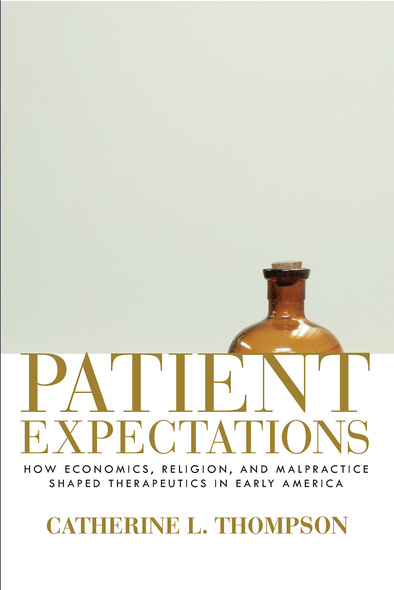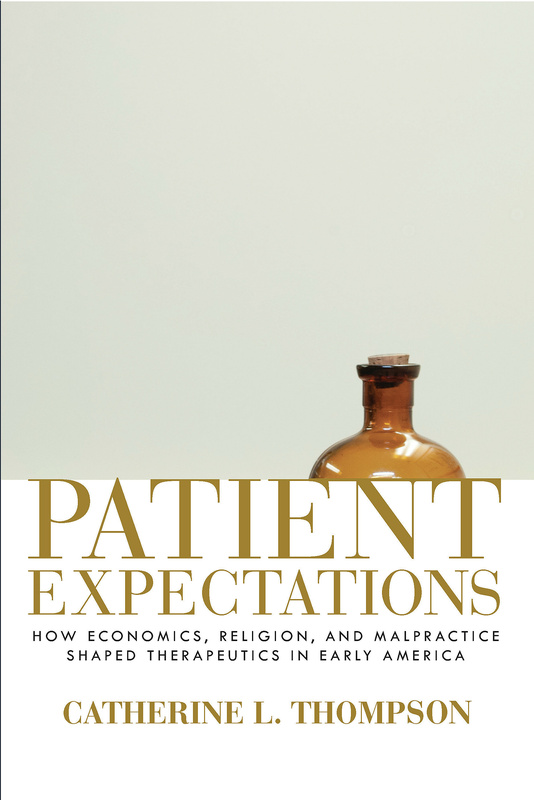Patient Expectations
How Economics, Religion, and Malpractice Shaped Therapeutics in Early America
University of Massachusetts Press
During the first half of the nineteenth century a major shift occurred in the medical treatment of illness in the United States, as physicians abandoned the use of "heroic" depletive therapies—the pukes and purges made famous in the 1790s by Dr. Benjamin Rush of Philadelphia—in favor of a let-nature-take-its-course approach to most diseases. Standard histories of American medicine have long attributed this shift to new theories and training methods as well as increased competition from homeopaths and botanical doctors. In this book, Catherine L. Thompson challenges that interpretation by emphasizing the role of patients as active participants in their own health care rather than passive objects of medical treatment.
Focusing on Massachusetts, then as now a center of U.S. medical education and practice, Thompson draws on data from patients' journals, medical account ledgers, physicians' daybooks, and court records to link changes in medical treatment to a gradual evolution of patient expectations across varied populations. Specifically, she identifies three developments—the increasing use of cash in medical transactions, growing religious pluralism, and the rise of malpractice suits—as key factors in transforming patients into active medical consumers unwilling to submit to doctors' advice without considering alternatives.
By showing how nineteenth-century patients shaped therapeutic practice "through the medical choices they made or didn't make," Thompson's study alters our understanding of American medicine in the past and has implications for its present and future.
Focusing on Massachusetts, then as now a center of U.S. medical education and practice, Thompson draws on data from patients' journals, medical account ledgers, physicians' daybooks, and court records to link changes in medical treatment to a gradual evolution of patient expectations across varied populations. Specifically, she identifies three developments—the increasing use of cash in medical transactions, growing religious pluralism, and the rise of malpractice suits—as key factors in transforming patients into active medical consumers unwilling to submit to doctors' advice without considering alternatives.
By showing how nineteenth-century patients shaped therapeutic practice "through the medical choices they made or didn't make," Thompson's study alters our understanding of American medicine in the past and has implications for its present and future.
Precise and powerful, wide-ranging and illuminating, Patient Expectations offers the first patient-centered history of the transformation of American medicine in the early Republic. Thompson concludes that physicians made far more limited use of heroic therapies than historians have previously acknowledged and that private practitioners in particular were strikingly tolerant of self-medication and alternative remedies.'—Richard Bell, author of We Shall Be No More: Suicide and Self-Government in the Newly United States
'Careful, precise analysis of the data the author has studiously assembled . . . This reviewer was fascinated to learn how early (during the Colonial period) malpractice suits were brought against practitioners and that the lawsuits were transactional. The physician promised a cure; the patient did not recover; an action could be initiated. There were no subtleties in terms of mistakes. Patient Expectations is a worthwhile study for advanced students and medical historians. Recommended.'—Choice
'Concise and well-written . . . Thompson provides nuance to findings by examining physician case books of community-based physicians in Boston and elsewhere in the state. . . . One of the virtues of Thompson's book is its relative brevity and the comparatively low price of the paperback edition. Patient Expectations can serve as an assigned text in introductory courses in American medical history or general medical history courses.'—Bulletin of the History of Medicine
'Thompson contributes to understanding how patients in a particular region helped shape early American mideical practice.'—Social History of Medicine
'Patient Expectations is grounded on a solid foundation of research. . . . Thompson's insistence that patients made informed choices about medical care is an important signpost for future studies.'—American Historical Review
'Thompson focuses on topics that have been relatively neglected by earlier historians dealing with nineteenth-century health care. She discusses, for example, how the waning of Calvinism led more Americans to view pain and disease not as a divine act or a necessary test of faith but as violations of a benevolent God's plan for human progress. Enlightenment thinking as well as scientific advances also promoted viewing the 'ailing body as a machine that could be fixed.' . . . Cathy Thompson has produced a substantive work of scholarship . . . placing patients and their efforts for better health square at the center of historical inquiry.'—New England Quarterly
Catherine L. Thompson is visiting assistant professor, College of the Holy Cross, Worcester.





